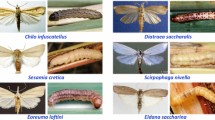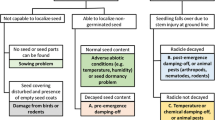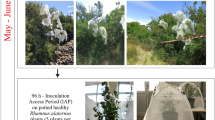Abstract
Exploring the interactions between host plants, herbivores, and natural enemies is an important experimental approach for enhancing biological control. Induced plant defense responses following infestation by herbivores enable plants to minimize damage. Orius sauteri (Poppius), an important generalist predator, has been widely used as a biological control agent for suppressing many agricultural pests on agronomic and horticultural crops. Because this predator oviposits and feeds on plant tissue, in this work we hypothesized that these behaviors can induce defenses that modulate the subsequent pest attack. For this, we explored the fitness parameters of two key pests, the western flower thrips Frankliniella occidentalis (Pergande) and the tobacco whitefly Bemisia tabaci (Gennadius), on three different O. sauteri-pre-inoculated plant species, tomato, cucumber, and cowpea when compared to non-pre-inoculated plants. Pre-inoculation of O. sauteri on these three plant species decreased the performance of both herbivore pests but to differing degrees. The survival of F. occidentalis on tomato and B. tabaci on cowpea was significantly reduced on O. sauteri-pre-inoculated plants compared to non-inoculated plants. The reproduction of B. tabaci on tomato, cucumber, and cowpea was decreased in varying degrees by the pre-release of O. sauteri, whereas in the case of F. occidentalis the reproduction was only reduced on tomato and cucumber pre-inoculated plants. These results further enhance our knowledge of ecological relationships between natural enemies and herbivores and provide the context for the early release of natural enemies to control pests.




Similar content being viewed by others
References
Aljbory Z, Chen MS (2018) Indirect plant defense against insect herbivores: a review. Insect Sci 25:2–23. https://doi.org/10.1111/1744-7917.12436
Aparicio Y, Gabarra R, Arno J (2020) Interactions among Myzus persicae, predators and parasitoids may hamper biological control in Mediterranean peach orchards. Entomol Gen 40:217–228. https://doi.org/10.1127/entomologia/2020/0946
Bouagga S, Urbaneja A, Rambla JL, Flors V, Granell A, Jaques JA, Pérez-Hedo M (2018a) Zoophytophagous mirids provide pest control by inducing direct defences, antixenosis and attraction to parasitoids in sweet pepper plants. Pest Manag Sci 74:1286–1296. https://doi.org/10.1002/ps.4838
Bouagga S, Urbaneja A, Rambla JL, Granell A, Pérez-Hedo M (2018b) Orius laevigatus strengthens its role as a biological control agent by inducing plant defenses. J Pest Sci 91:55–64. https://doi.org/10.1007/s10340-017-0886-4
Chailleux A, Mohl EK, Teixeira-Alves M, Messelink GJ, Desnuex N (2014) Natural enemy-mediated indirect interactions among prey species: potential for enhancing biocontrol services in agroecosystems. Pest Manag Sci 70:1769–1779. https://doi.org/10.1002/ps.3916
Clavijo MA, Unsicker SB, Gershenzon J (2012) The specificity of herbivore-induced plant volatiles in attracting herbivore enemies. Trends Plant Sci 17:303–310. https://doi.org/10.1016/j.tplants.2012.03.012
De Puysseleyr V, Höfte M, De Clercq P (2010) Ovipositing Orius laevigatus increase tomato resistance against Frankliniella occidentalis feeding by inducing the wound response. Arth-Plant Int 5:71–80. https://doi.org/10.1007/s11829-010-9117-0
Desneux N, O’Neil RJ (2008) Potential of an alternative prey to disrupt predation of the generalist predator, Orius insidiosus, on the pest aphid, Aphis glycines, via short-term indirect interactions. Bull Entomol Res 98:631–639. https://doi.org/10.1017/S0007485308006238
Desneux N, O’Neil RJ, Yoo HJS (2006) Suppression of population growth of the soybean aphid, Aphis glycines Matsumura, by predators: the identification of a key predator and the effects of prey dispersion, predator abundance, and temperature. Environ Entomol 35:1342–1349. https://doi.org/10.1093/ee/35.5.1342
Desneux N, Decourtye A, Delpuech JM (2007) The sublethal effects of pesticides on beneficial arthropods. Annu Rev Entomol 52:81–106. https://doi.org/10.1146/annurev.ento.52.110405.091440
Desneux N, Kaplan I, Yoo HJS, Wang S, O’Neil RJ (2019) Temporal synchrony mediates the outcome of indirect effects between prey via a shared predator. Entomol Gen 39:127–136. https://doi.org/10.1127/entomologia/2019/0824
Di N, Zhang K, Zhang F, Wang S, Liu TX (2018) Polyculture and monoculture affect the fitness, behavior and detoxification metabolism of Bemisia tabaci (Hemiptera: Aleyrodidae). Front Physiol 9:1392. https://doi.org/10.3389/fphys.2018.01392
Di N, Zhang K, Xu QX, Zhang F, Harwood JD, Wang S, Desneux N (2021) Predatory ability of Harmonia axyridis (Coleoptera: Coccinellidae) and Orius sauteri (Hemiptera: Anthocoridae) for suppression of fall armyworm Spodoptera frugiperda (Lepidoptera: Noctuidae). Insects 12:1063. https://doi.org/10.3390/insects12121063
Dicke M, Baldwin IT (2010) The evolutionary context for herbivore-induced plant volatiles: beyond the ‘cry for help.’ Trends Plant Sci 15:167–175. https://doi.org/10.1016/j.tplants.2009.12.002
Ding HY, Lin YY, Tuan SJ, Tang LC, Chi H, Atlihan R, Ozgokce MS, Guncan A (2021) Integrating demography, predation rate, and computer simulation for evaluation of Orius strigicollis as biological control agent against Frankliniella intonsa. Entomol Gen 41:179–196. https://doi.org/10.1127/entomologia/2020/1082
Gatehouse JA (2002) Plant resistance towards insect herbivores: a dynamic interaction. New Phytol 156:145–169. https://doi.org/10.1046/j.1469-8137.2002.00519.x
Ge Y, Liu PP, Zhang L, Snyder WE, Smith OM, Shi WP (2019) A sticky situation: honeydew of the pear psylla disrupts feeding by its predator Orius sauteri. Pest Manag Sci 76:75–84. https://doi.org/10.1002/ps.5498
Guo JP, Xu CX, Wu D, Zhao Y, Qiu YF, Wang XX, Ouyang YD, Cai BD, Liu X, Jing SL, Shangguan XX, Wang HY, Ma YH, Hu L, Wu Y, Shi SJ, Wang WL, Zhu LL, Xu X, Chen RZ, Feng YQ, Du B, He GC (2018) Bph6 encodes an exocyst-localized protein and confers broad resistance to planthoppers in rice. Nat Genet 50:297–306. https://doi.org/10.1038/s41588-018-0039-6
Han P, Becker C, Le Bot J, Larbat R, Lavoir AV, Desneux N (2020) Plant nutrient supply alters the magnitude of indirect interactions between insect herbivores: from foliar chemistry to community dynamics. J Ecol 108:1497–1510. https://doi.org/10.1111/1365-2745.13342
Han P, Lavoir AV, Rodriguez-Saona C, Desneux N (2022) Bottom-up forces in agroecosystems and their potential impact on arthropod pest management. Annu Rev Entomol 67:239–259. https://doi.org/10.1146/annurev-ento-060121-060505
Hatano E, Saveer AM, Borrero-Echeverry F, Strauch M, Zakir A, Bengtsson M, Ignell R, Anderson P, Becher PG, Witzgall P, Dekker T (2015) A herbivore-induced plant volatile interferes with host plant and mate location in moths through suppression of olfactory signalling pathways. BMC Biol 13:75. https://doi.org/10.1186/s12915-015-0188-3
Kersch-Becker MF, Thaler JS, Sanders N (2019) Constitutive and herbivore-induced plant defences regulate herbivore population processes. J Anim Ecol 88:1079–1088. https://doi.org/10.1111/1365-2656.12993
Kessler A, Baldwin IT (2001) Defensive function of herbivore-induced plant volatile emissions in nature. Science 291:2141–2144. https://doi.org/10.1126/science.291.5511.2141
Lattin JD (1999) Bionomics of Anthocoridae. Annu Rev Entomol 44:207–231. https://doi.org/10.1146/annurev.ento.44.1.207
Leiss KA, Choi YH, Abdel-Farid IB, Verpoorte R, Klinkhamer PG (2009) NMR metabolomics of thrips (Frankliniella occidentalis) resistance in Senecio hybrids. J Chem Ecol 35:219–229. https://doi.org/10.1007/s10886-008-9586-0
Lin RH, He D, Men XY, Zheng L, Cheng SH, Tao LM, Yu CH (2020) Sublethal and transgenerational effects of acetamiprid and imidacloprid on the predatory bug Orius sauteri (Poppius) (Hemiptera: Anthocoridae). Chemosphere 255:126778. https://doi.org/10.1016/j.chemosphere.2020.126778
Lundgren JG, Fergen JK, Riedell WE (2008) The influence of plant anatomy on oviposition and reproductive success of the omnivorous bug Orius insidiosus. Anim Behav 75:1495–1502. https://doi.org/10.1016/j.anbehav.2007.09.029
Lundgren JG, Wyckhuys KAG, Desneux N (2009) Population responses by Orius insidiosus to vegetational diversity. Biocontrol 54:135–142. https://doi.org/10.1007/s10526-008-9165-x
Mathur V, Tytgat TOG, Hordijk CA, Harhangi HR, Jansen JJ, Reddy AS, Harvey JA, Vet LEM, van Dam NM (2013) An ecogenomic analysis of herbivore-induced plant volatiles in Brassica juncea. Mol Ecol 22:6179–6196. https://doi.org/10.1111/mec.12555
Meena MK, Prajapati R, Krishna D, Divakaran K, Pandey Y, Reichelt M, Mathew MK, Boland W, Mithofer A, Vadassery J (2019) The Ca2+ channel CNGC19 regulates Arabidopsis defense against Spodoptera herbivory. Plant Cell 31:1539–1562. https://doi.org/10.1105/tpc.19.00057
Mirnezhad M, Romero-Gonzalez RR, Leiss KA, Choi YH, Verpoorte R, Klinkhamer PG (2010) Metabolomic analysis of host plant resistance to thrips in wild and cultivated tomatoes. Phytochem Anal 21:110–117. https://doi.org/10.1002/pca.1182
Mithöfer A, Boland W (2012) Plant defense against herbivores: chemical aspects. Annu Rev Plant Biol 3:431–450. https://doi.org/10.1146/annurev-arplant-042110-103854
Mouttet R, Bearez P, Thomas C, Desneux N (2011) Phytophagous arthropods and a pathogen sharing a host plant: evidence for indirect plant-mediated interactions. PLoS ONE 6:e18840. https://doi.org/10.1371/journal.pone.0018840
Mouttet R, Kaplan I, Bearez P, Amiens-Desneux E, Desneux N (2013) Spatiotemporal patterns of induced resistance and susceptibility linking diverse plant parasites. Oecologia 173:1379–1386. https://doi.org/10.1007/s00442-013-2716-6
Naselli M, Urbaneja A, Siscaro G, Jaques JA, Zappalà L, Flors V, Pérez-Hedo M (2016) Stage-related defense response induction in tomato plants by Nesidiocoris tenuis. Int J Mol Sci 17:1210. https://doi.org/10.3390/ijms17081210
Ogino T, Uehara T, Muraji M, Yamaguchi T, Ichihashi T, Suzuki T, Kainoh Y, Shimoda M (2016) Violet LED light enhances the recruitment of a thrip predator in open fields. Sci Rep 6:32302. https://doi.org/10.1038/srep32302
Pappas ML, Steppuhn A, Geuss D, Topalidou N, Zografou A, Sabelis MW, Broufas GD (2015) Beyond predation: the zoophytophagous predator Macrolophus pygmaeus induces tomato resistance against spider mites. PLoS ONE 10:e0127251. https://doi.org/10.1371/journal.pone.0127251
Pascua MS, Rocca M, Clercq DP, Greco NM (2019) Host plant use for oviposition by the insidious flower bug (Hemiptera: Anthocoridae). J Econ Entomol 112:219–225. https://doi.org/10.1093/jee/toy310
Pérez-Hedo M, Bouagga S, Jaques JA, Flors V, Urbaneja A (2015a) Tomato plant responses to feeding behavior of three zoophytophagous predators (Hemiptera: Miridae). Biol Control 86:46–51. https://doi.org/10.1016/j.biocontrol.2015.04.006
Pérez-Hedo M, Urbaneja-Bernat P, Jaques JA, Flors V, Urbaneja A (2015b) Defensive plant responses induced by Nesidiocoris tenuis (Hemiptera: Miridae) on tomato plants. J Pest Sci 88:543–554. https://doi.org/10.1007/s10340-014-0640-0
Pérez-Hedo M, Riahi C, Urbaneja A (2020) Use of zoophytophagous mirid bugs in horticultural crops: Current challenges and future perspectives. Pest Manag Sci 77:33–42. https://doi.org/10.1002/ps.6043
Pérez-Hedo M, Alonso-Valiente M, Vacas S, Gallego C, Navarro-Llopis RJL, V, Granell A, Urbaneja A (2021) Eliciting tomato plant defenses by exposure to herbivore induced plant volatiles. Entomol Gen 41:209–218. https://doi.org/10.1127/entomologia/2021/1196
Pérez-Hedo M, Bouagga S, Zhang NX, Moerkens R, Messelink G, Jaques JA, Flors V, Broufas G, Urbaneja A, Pappas ML (2022) Induction of plant defenses: the added value of zoophytophagous predators. J Pest Sci. https://doi.org/10.1007/s10340-022-01506-3
Qian L, Huang ZJ, Liu XW, Li CX, Gao YL, Gui FR, Chang XL, Chen FJ (2021) Effect of elevated CO2 on interactions between the host plant Phaseolus vulgaris and the invasive western flower thrips, Frankliniella occidentalis. J Pest Sci 94:43–54. https://doi.org/10.1007/s10340-020-01208-8
Seagraves MP, Lundgren JG (2010) Oviposition response by Orius insidiosus (Hemiptera: Anthocoridae) to plant quality and prey availability. Biol Control 55:174–177. https://doi.org/10.1016/j.biocontrol.2010.06.013
Seagraves MP, Riedell WE, Lundgren JG (2010) Oviposition preference for water-stressed plants in Orius insidiosus (Hemiptera: Anthocoridae). J Insect Behav 24:132–143. https://doi.org/10.1007/s10905-010-9242-8
Sun XH, Xu XN, Wang ED (2009) The prey preference of Orius sauteri on western flower thrips and two-spotted spider mite. Acta Ecol Sin 29:6285–6291. https://doi.org/10.3321/j.issn:1000-0933.2009.11.065
Tan XL, Wang S, Liu TX (2014) Acceptance and suitability of four plant substrates for rearing Orius sauteri (Hemiptera: Anthocoridae). Biocontrol Sci Technol 24:291–302. https://doi.org/10.1080/09583157.2013.860079
Tonga A, Çakmak S, Şeker K, Temiz MG, Bayram A (2020) cis-Jasmone treatments affect multiple sucking insect pests and associated predators in cotton. Entomol Gen 40:49–61. https://doi.org/10.1127/entomologia/2019/0771
Turlings TCJ, Erb M (2018) Tritrophic interactions mediated by herbivore-induced plant volatiles: mechanisms, ecological relevance, and application potential. Annu Rev Entomol 63:433–452. https://doi.org/10.1146/annurev-ento-020117-043507
van Lenteren JC, Bolckmans K, Köhl J, Ravensberg WJ, Urbaneja A (2017) Biological control using invertebrates and microorganisms: plenty of new opportunities. Biocontrol 63:39–59. https://doi.org/10.1007/s10526-017-9801-4
Wang YP, Wu H, Bu WJ, Xu HC (2003) Geographic distribution of the genus Orius Wolff (Heteroptera: Anthocoridae). J Zhejiang a&f Univ 20:389–393. https://doi.org/10.3969/j.issn.2095-0756.2003.04.013
Wang HL, Qin XF, Yu H, Wang GC (2013) Predation of Orius sauteri on MEAM1 Bemisia tabaci Pseudopupae. J Ecol Rural Environ 29:132–135. https://doi.org/10.3969/j.issn.1673-4831.2013.01.023
Wang R, Wang XL, Wang S, Zhang F (2014a) Evaluation of the potential biocontrol capacity of Orius sauteri (Hemiptera, Anthocoridae) on Frankliniella occidentalis (Thysanoptera, Thripidae). J Environ Entomol 36:983–989. https://doi.org/10.3969/j.issn.1674-0858.2014.06.19
Wang S, Michaud JP, Zhang F (2014b) Comparative suitability of aphids, thrips and mites as prey for the flower bug Orius sauteri (Hemiptera: Anthocoridae). Eur J Entomol 111:221–226. https://doi.org/10.14411/eje.2014b.031
Wang SX, Di N, Chen X, Zhang F, Biondi A, Desneux N, Wang S (2018) Life history and functional response to prey density of the flower bug Orius sauteri attacking the fungivorous sciarid fly Lycoriella pleuroti. J Pest Sci 92:715–722. https://doi.org/10.1007/s10340-018-1032-7
Watanabe M, Tagami Y, Miura K, Kageyama D, Stouthamer R (2012) Distribution patterns of Wolbachia endosymbionts in the closely related flower bugs of the genus Orius: implications for ccoevolution and horizontal transfer. Microb Ecol 6:537–545. https://doi.org/10.1007/s00248-012-0042-x
Wu YQ, Zhao MQ, Yang SF, Duan Y, Jiang YL (2010) Predations of Orius sauteri (Hemiptera: Anthocoridae) on four insect pests. Chin J Biol Control 26:13–17. https://doi.org/10.16409/j.cnki.2095-039x.2010.01.001
Xu XN, Enkegaard A (2009) Prey preference of Orius sauteri between western flower thrips and spider mites. Entomol Exp Appl 132:93–98. https://doi.org/10.1111/j.1570-7458.2009.00867.x
Xu H, Turlings TCJ (2018) Plant volatiles as mate-finding cues for insects. Trends Plant Sci 23:100–111. https://doi.org/10.1016/j.tplants.2017.11.004
Ye M, Veyrat N, Xu H, Hu L, Turlings TCJ, Erb M (2018) An herbivore-induced plant volatile reduces parasitoid attraction by changing the smell of caterpillars. Sci Adv 4:eaar4767. https://doi.org/10.1126/sciadv.aar4767
Yin J, Gao XG, Wu YQ, Jiang YL, Liu ST, Duan AJ, Zhang ZQ, Liu CY (2013) Thrips control on the greenhouse eggplant by releasing Orius sauteri (Heteroptera: Anthocoridae). Chin J Biol Control 29:459–462. https://doi.org/10.16409/j.cnki.2095-039x.2013.03.021
Zhang AS, Yu Y, Li LL, Zhang SC, Men XY (2007) Predation of Orius sauteri adult on adults of western flower thrips (Frankliniella occidentalis), an invasive insect pest. Chin J Ecol 27:1903–1909. https://doi.org/10.3321/j.issn:1000-0933.2007.05.029
Zhang K, Di N, Ridsdill-Smith J, Zhang BW, Tan XL, Cao HH, Liu YH, Liu TX (2014) Does a multi-plant diet benefit a polyphagous herbivore? A case study with Bemisia tabaci. Entomol Exp Appl 152:148–156. https://doi.org/10.1111/eea.12210
Zhang NX, Messelink GJ, Alba JM, Schuurink RC, Kant MR, Janssen A (2018a) Phytophagy of omnivorous predator Macrolophus pygmaeus affects performance of herbivores through induced plant defences. Oecologia 186:101–113. https://doi.org/10.1007/s00442-017-4000-7
Zhang PJ, He YC, Zhao C, Ye ZH, Yu XP (2018b) Jasmonic acid-dependent defenses play a key role in defending tomato against Bemisia tabaci nymphs, but not adults. Front Plant Sci 9:1065. https://doi.org/10.3389/fpls.2018.01065
Zhang X, van Doan C, Arce CCM, Hu LF, Gruenig S, Parisod C, Hibbard BE, Hervé MR, Nielson C, Robert CAM, Machado RAR, Erb M (2019) Plant defense resistance in natural enemies of a specialist insect herbivore. Proc Natl Acad Sci U S A 116:23174–23181. https://doi.org/10.1073/pnas.1912599116
Zhao Y, Huang J, Wang ZZ, Jing SL, Wang Y, Ouyang YD, Cai BD, Xin XF, Liu X, Zhang CX, Pan YF, Ma R, Li QF, Jiang WH, Zeng Y, Shangguan XX, Wang HY, Du B, Zhu LL, Xu X, Feng YQ, He SY, Chen RZ, Zhang QF, He GC (2016) Allelic diversity in an NLR gene BPH9 enables rice to combat planthopper variation. Proc Natl Acad Sci U S A 113:12850–12855. https://doi.org/10.1073/pnas.1614862113
Zhao J, Guo XJ, Tan XJ, Desneux N, Zappala L, Zhang F, Wang S (2017) Using Calendula officinalis as a floral resource to enhance aphid and thrips suppression by the flower bug Orius sauteri (Hemiptera: Anthocoridae). Pest Manag Sci 73:515–520. https://doi.org/10.1002/ps.4474
Acknowledgements
The authors thank Dr. Yulin Gao from the Institute of Plant Protection, Chinese Academy of Agricultural Sciences, for kindly providing western flower thrips.
Funding
The following funding funded the work: Youth Program of National Natural Science Foundation of China (31901945); Youth Scientific Research Funds of Beijing Academy of Agriculture and Forestry Sciences (QNJJ201917); Beijing Excellent Person Program (2018000020060G181); Beijing Science and Technology Plan (Z201100008020014).
Author information
Authors and Affiliations
Corresponding authors
Ethics declarations
Conflict of interest
The authors declare no conflict of interest.
Additional information
Communicated by Alberto Urbaneja .
Publisher's Note
Springer Nature remains neutral with regard to jurisdictional claims in published maps and institutional affiliations.
Rights and permissions
About this article
Cite this article
Di, N., Zhu, Z., Harwood, J.D. et al. Fitness of Frankliniella occidentalis and Bemisia tabaci on three plant species pre-inoculated by Orius sauteri. J Pest Sci 95, 1531–1541 (2022). https://doi.org/10.1007/s10340-022-01543-y
Received:
Revised:
Accepted:
Published:
Issue Date:
DOI: https://doi.org/10.1007/s10340-022-01543-y




